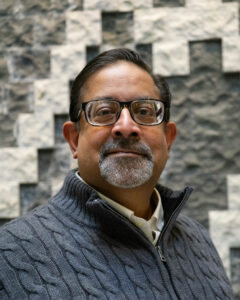Dhavan Shah
McLeod Professor of Communication Research; Maier-Bascom Chair; Director, MCRC; Research Director, CCCR
- Website
- dshah.journalism.wisc.edu

Dhavan V. Shah is the Jack M. McLeod Professor of Communication Research and Louis A. & Mary E. Maier-Bascom Chair at the University of Wisconsin-Madison, where he is Director of the Mass Communication Research Center (MCRC) and Research Director of the Center for Communication and Civic Renewal (CCCR). Housed in the School of Journalism and Mass Communication with appointments in Industrial and Systems Engineering, Marketing, and Political Science, his research focuses on the influence of mass media and interpersonal communication on social judgments, civic engagement, and health support.
His focus on the intersecting power of framing and social capital has shaped his three major lines of inquiry: (1) the influence of message construction and processing in social evaluations and behaviors, (2) the capacity of mass and interpersonal communication, especially online networks, to shape civic engagement, political participation, and social trust, and (3) the role of online interactions, particularly support expression, on the management of cancer, aging, and addiction (link to CV). He combines conventional and computational social science approaches to study politics and health, and often works with computer scientists and engineers to translate research insights into scalable systems to address pressing social problems.
His teaching includes J345, Principles of Strategic Communication; J566, Communication and Public Opinion; J658, Communication Research Methods; J801, Mass Media and the Individual; J813, Practicum in Communication Research; and J829, Political Communication. Shah works with fellow faculty and graduate students in three research teams: (1) Social Media and Democracy – SMAD, (2) Civic Culture and Contentious Politics/Center for Communication and Civic Renewal – CCCP/CCCR, and (3) Health Information Technology Studies – HITS. Articles from these collaborations appear in leading communication, political science, and health informatics journals (see his website’s research section). He has written over 200 articles and chapters, coedited four books, and coauthored News Frames and National Security: Covering Big Brother and Battleground: Asymmetric Communication Ecologies and the Erosion of Civil Society in Wisconsin (both Cambridge University Press). Shah has served as major advisor for over 30 completed Ph.Ds. and a committee member on another 90 dissertations across eight departments.
Much of this work has been supported by grants and awards totaling over $62 million in funding from private foundations (e.g., Carnegie, Ford, Knight, Russell Sage), large public entities (Public Broadcasting Service, Corporation for Public Broadcasting, Social Science Korea), and the federal government (e.g., National Science Foundation, National Institutes of Health). Shah has used this support to conduct multi-wave national and regional panel studies and content tracking of the 2000, 2004, 2008, 2014, 2016, 2018, 2020, and 2022 elections through the MCRC, examining traditional and digital media in relation to social and political outcomes. Since 2008, he has supported a series of large P-50 (specialized center grants) and R-01 (clinical trials and implementation studies) awards concerning cancer communication, active aging, and addiction treatment, with his most recent work centering on the using technology to support “aging in place” and recovery from opioid and alcohol use disorders. Beginning in 2021, he added the role of research director in the CCCR, which he helped establish with Knight Foundation funding.
Shah has served on the editorial boards of 16 journals and book series, numerous international advisory boards and external review committees, and held leadership positions in AEJMC, ICA, and APSA. He is the recipient of 24 top paper awards from national and international conferences and numerous other honors, including the Nafziger-White Dissertation Award, the Krieghbaum Under-40 Award, and Article of the Year Awards in Political Communication (ICA-2006) and Information Technology and Politics (APSA-2008), and the Belfer Fellowship (ADL-2022). He has been a visiting professor/distinguished lecturer at two-dozen universities in the Americas, Europe, and Asia. He was elected a Fellow of the International Communication Association in 2016, and Fellow’s Chair in 2020. He received the ICA B. Aubrey Fisher Mentorship Award, one of ICA’s highest honors, in 2022.
He received his B.A. from the UW-Madison’s SJMC in 1989, after which he worked at Leo Burnett Co. and as a consultant to Fallon, BBDO, and Carmichael Lynch. He earned his M.A. in 1995 and Ph.D. in 1999 from Minnesota in Mass Communication with a minor in Political Psychology. In the UW, he has received the Vilas Associates Award, the Chancellor’s Award for Excellence, the Kellett Mid-Career Award, and the Vilas Faculty Mid-Career Investigator Award. He gained tenure in 2002, was promoted to full professor in 2004, awarded the Maier-Bascom Professorship in 2006, and the WARF Named Professorship in 2023.